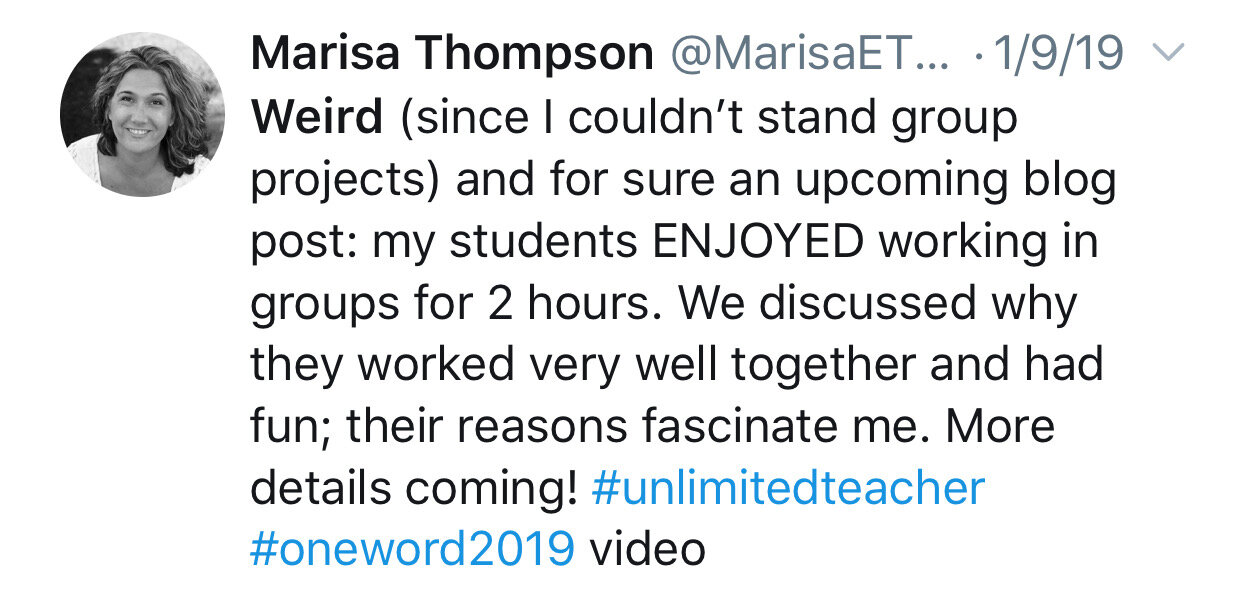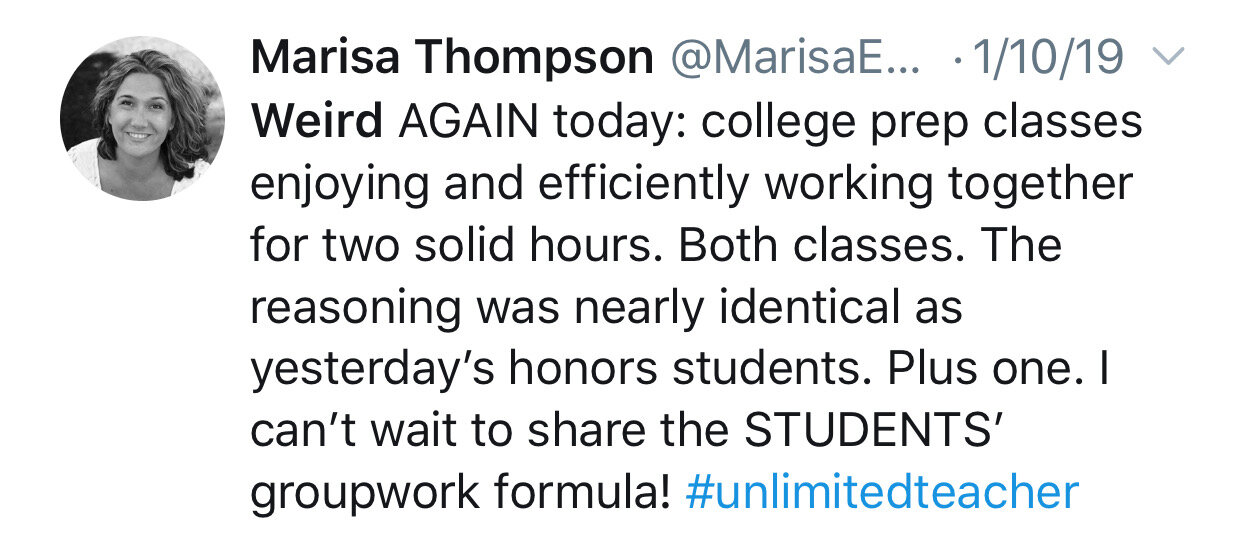Tips from Students: Teamwork, Not Group Work
Remember when your teacher would assign a group project?
I can’t remember whether I held my breath or extended a scoff-like sigh, but I do remember trying to think of my weekend plans, knowing I'd probably be the one who would finish it at home.
Just as my group members knew I would probably be the one who would finish at home.
I hated group projects.
In 9th grade, my geometry teacher went so far as to assign a group test. He’d grade one page from each group member’s test and then the total score would be the score for everyone in the group. Test after test, my group members would wait for me to finish the test and then copy my work (which was probably smart; I was really good at Geometry and really struggled to not repeatedly fail Algebra II). But the one time I didn’t let them copy, my teacher said it was “selfish.”
Yes, we remember group projects. We remember that feeling, their supposed purpose, the extensive instruction list. But here’s the interesting part: I love group projects.
Now, as a teacher, I love group projects. And strangely, so do the vast majority of my students.
For the past two weeks, all four of my classes, Honors and College Prep, have been working on a project. And it's been weird. Twilight Zone weird.
In one class, we're lucky to have a fantastic aide. Last week, she gave me that "what's happening here" look and then we met somewhere and watched, questioning the transformation while making sure we didn't disturb it.
Day 1
Our aide: What do you think it is?
Me: I honestly don't know but I'm not going to risk anything by trying to find out.
Our aide: Don't.
...
Me: Weird, isn't it?
Day 2, Day 3...
Our aide: It's still happening...
Me: I know...
Our aide: Have you figured it out yet?
Me: ...
Our aide: You will.
If you missed my Twitter posts on those days:


We figured out why our group projects actually do provide students the opportunity to learn the life skills they need to practice, allow them to enjoy the experience, and push them enough to the point they can be proud of their work.
Or rather, we didn't figure it out. I asked and my students told me.
A Scene from our Classroom
Me (observing all students working efficiently and speaking professionally for 1.5 block periods; slightly shocked and genuinely confused): Why is this working so well?
40+ Students (looking at each other): LOL
Me (still genuinely confused): No, ok… But seriously. Why is this working so well? Do group projects work this well in other classes?
40+ Students (looking at each other): LOL
Me (frustrated by being genuinely confused and feeling like they know a big secret and won’t tell me because I’m an adult): Then what is it? Why is it working so well?
They gave me a list.
40+ Students:
This project doesn’t have instructions so we have to talk to each other to make our own plan.
In other classes, there’s a long list of instructions and it’s not about working together or creating anything together; we just divide up the work and then fight when someone doesn’t do their job.
There’s a deadline so there’s not a lot of time to waste. (This is their final for the semester).
The only requirement you gave us is the length of the video so there are so many decisions to make and lots of opportunities to be creative. We don’t have a choice but to collaborate.
We get to make something cool about something we’ve lived. (It’s our OneWord Videos which are best described as persuasive video time capsules. For more information, see Renew Those New Year Reflections.)
Everyone knows something about this topic and so everyone feels ok contributing. It’s not like a project about a book and a group member didn’t read it or was absent a lot. Everyone has something to say and everyone has an idea.
You told us if we asked you a question which we could figure out on our own then you’d tell us we were “going to have to figure it out,” so we did.
Me:
Students chose a partner and then I strategically matched their partnership to make a group of 4. I think the 50/50 group mix was useful and respected students’ desire for comfort while meeting my need to have students take in some new opinions.
I explicitly let them know each day that they were smart and had 40 smart people around them all working through the same project. I also reminded them they had laptops and phones.
We discussed the learning which was to happen, why they might struggle at first with collaborating, how they will improve each day, and when they’ll use these skills.
I reminded students the experience itself was the learning and the goal, not the product.
Before class we would revisit our purpose and sometimes shared tips, questions, epiphanies by group regarding the making of the video or how to work effectively; their work goal and teamwork goal.
An hour in, and then with 30 minutes left, I’d offer reminders: 60 minutes have passed. How is your productivity? How do you feel about your teamwork? What do you want to accomplish in the next 30 minutes and what’s the best way to do it? Tell your team!
I reminded students of our instruction-less challenges: how creative they were and effective they were when they worked together; and their results when they did not.
The problem isn't students can't work as a team; they can.
But when we control the details, we take all of the teamwork out of the group work.
I’m excited to see the videos and will make sure to share! I'm crossing my finger the products are as amazing as their teamwork!
